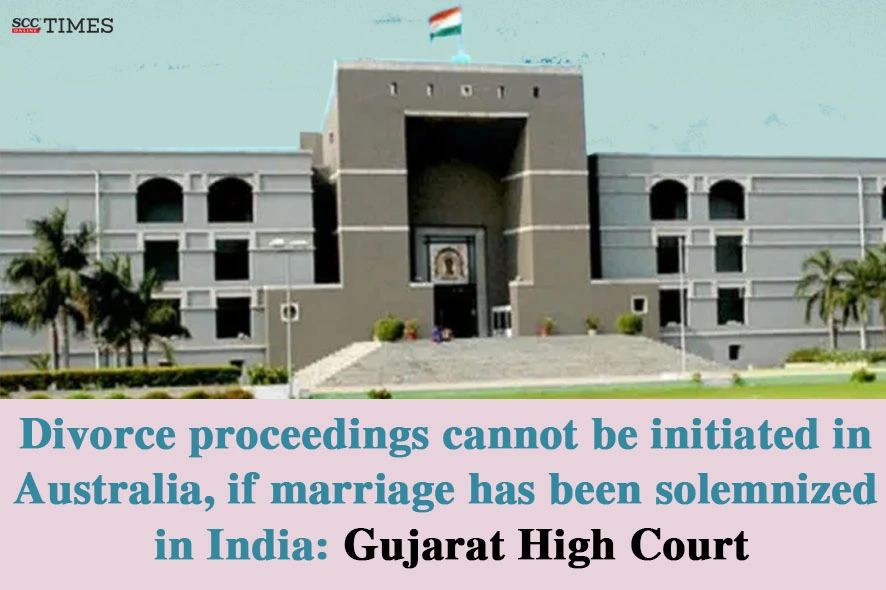Gujarat High Court: In a common judgement adjudging two appeals filed by the appellant (‘wife’) against the Family Court order dated 31-3-2023 (‘impugned order’), wherein the Family Court had rejected the wife’s plaint for declaration of a divorce decree passed by Australian Court as null and void and for restitution of conjugal rights; the Division Bench of A.Y. Kogje and N.S. Sanjay Gowda*, JJ, set aside the impugned order and held that the respondent (‘husband’) could not have initiated divorce proceedings in an Australian Court when the marriage had been solemnized in India even though the parties had acquired foreign domicile.
Background
The wife and the husband had been married since 2008. Their marriage had been duly solemnized as per Hindu rituals and was registered under the Gujarat Registration of Marriages Act, 2006. One and a half months later, the husband had moved to Australia where the wife subsequently joined him. The husband had acquired citizenship of Australia in 2011 and in 2014, due to marital conflicts, he had returned to India. In 2015 the husband had secured an Overseas Citizenship of India Card (OCI Card). At the same time the wife had secured citizenship in Australia. The husband had initiated divorce proceedings in Federal Circuit Court of Australia in 2016, and the Court had granted him the same. The wife then filed a review application for the order which had been dismissed. Simultaneously, the wife had also filed a petition with Family Court, Ahmedabad, under Section 125 of the Criminal Procedure Code, 1973 (‘CrPC’) read with Section 9 of the Hindu Marriage Act, 1955 (‘HMA’) seeking restitution of conjugal rights. The wife had also filed a family suit seeking declaration of the divorce decree passed by the Federal Circuit Court of Australia as null and void.
The Family Court, by the impugned order, had rejected both the plaints filed by the wife. The present suit was filed challenging the same.
The primary question before the Court was whether the Family Court was justified in rejecting the plaint for restitution of conjugal rights on the ground that both the parties were Australian citizens and their marriage had been dissolved by order of an Australian Court.
The husband had argued that there was no cause of action for the wife since both the husband and wife had become Australian citizens and therefore, Australian Courts were the competent authority for their dispute. According to the husband, this implied that the wife could not file a plaint for restitution of conjugal rights when a valid divorce decree existed.
The wife on the other hand had contended that since the marriage had been solemnized in India under the provisions of HMA, the Australian Courts did not have jurisdiction and could not have applied Australian laws to pass a divorce decree. The wife had also submitted that since both of them were residing in India at the time when the husband had filed for divorce, his only intention in doing so was to invoke the beneficial provisions of Australian laws rather than facing proceedings under the HMA.
Analysis, Law and Decision
The Court relied on the case of Y. Narasimha Rao v. Y. Venkata Lakshmi, (1991) 3 SCC 451, wherein the Supreme Court had held that marital disputes arising out of marriages which have taken place in India can only be governed by the provisions of the law under which the marriage has taken place, implying that the applicability of a foreign law to dissolve a marriage which had been performed under the provisions of the HMA is impermissible.
The Court observed that the Australian Court, while granting the decree of divorce had raised the question of whether a divorce granted by the Australian Court would be recognized under the Indian law but had ultimately held that since the husband was an Australian citizen, he was entitled to initiate divorce proceedings under Australian laws.
The Court further noted that both parties had obtained OCI card voluntarily, implying that they intended to retain their domicile by birth. The Court opined that since the marriage had been solemnized in India under Indian laws and both parties had retained their domicile by birth, either of the party could not be permitted to initiate proceedings in a country that had become their domicile by choice.
Thus, the Court held that the husband had no right to initiate proceedings in the Australian Courts by taking advantage of the fact that he had acquired Australian citizenship.
On the question of jurisdiction of Family Court to entertain a petition questioning a foreign decree, the Court noted that Section 7 of the Family Courts Act, 1984 conferred jurisdiction on the Family Court to adjudicate upon any dispute where matrimonial status of a person was in question. In the instant case, the wife had sought restitution of conjugal rights claiming that the divorce decree passed by the Australian Courts was null and void. Thus, the question before the Family Courts was regarding the matrimonial status of the wife and therefore, Family court was the appropriate forum to deliberate upon the issue.
Thus, the Court set aside the impugned order and directed the Family Court to decide on the plaints filed by the wife vis-à-vis restitution of conjugal rights and declaration of divorce decree by the Australian Court as null and void.
[X v. Y., 2025 SCC OnLine Guj 3730, decided on 8-8-2025]
Advocates who appeared in this case:
For the Appellant: Aaditya D. Bhatt, Chandni S. Joshi, Advocates
For the Respondent: Kshitij M. Amin, Rahul R. Dholakia, Advocates









Gujarat HC’s ruling reinforces that Hindu marriages solemnised in India must be governed by Indian law—foreign divorce decrees may not dissolve them. A vital affirmation of jurisdiction and legal clarity.